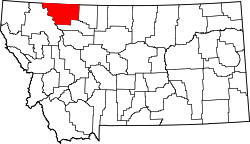St. Mary, Montana | |
|---|---|
 Downtown St. Mary looking north on U.S. Route 89 | |
 | |
| Coordinates: 48°44′34″N113°25′39″W / 48.74278°N 113.42750°W | |
| Country | United States |
| State | Montana |
| County | Glacier |
| Area | |
• Total | 0.75 sq mi (1.95 km2) |
| • Land | 0.75 sq mi (1.95 km2) |
| • Water | 0.00 sq mi (0.00 km2) |
| Elevation | 4,633 ft (1,412 m) |
| Population (2020) | |
• Total | 54 |
| • Density | 71.71/sq mi (27.71/km2) |
| Time zone | UTC-8 (Pacific (PST)) |
| • Summer (DST) | UTC-7 (PDT) |
| FIPS code | 30-65425 |
| GNIS feature ID | 2806626 [2] |
St. Mary or Saint Mary [2] (Blackfeet: Natoaki, "Holy Woman") is an unincorporated community on the western border of the Blackfeet Indian Reservation adjacent to Glacier National Park in Glacier County, Montana, United States. The village is the eastern terminus of the Going-to-the-Sun Road which bisects the park east to west, a distance of 53 mi (85 km).
Contents
About 54 people reside in the village year-round; however, the population increases tenfold on a busy summer evening. Several lodges, restaurants and cafés, a small grocery store, two gas stations and campgrounds are located in the village. A large housing area for National Park Service personnel is located adjacent to the village, but within the park.
U.S. Route 89 passes through the village, which lies between Saint Mary Lake in Glacier National Park and Lower St. Mary Lake on the Blackfeet Indian Reservation.


